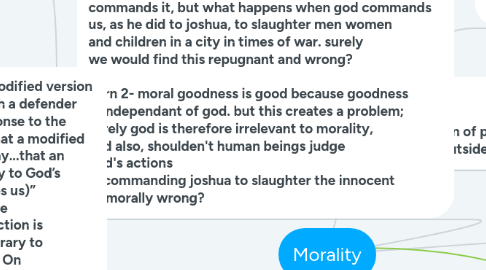Morality
by Razanne Abdalla

1. Christianity- Morality for a Christian is the application of God’s laws regarding a person’s private and public behavior. In his or her seeking to live a moral life, a Christian tries to obey the rules for his or her personal behavior that have been decreed by God and recorded in the Bible. Mathew 7:12- So whatever you wish that others would do to you, do also to them, for this is the Law and the Prophets Islam- Islam holds that moral positions are not relative, and instead, define a universal standard by which actions may be deemed moral or immoral. Islam’s moral system is striking in that it not only defines morality, but also guides the human race in how to achieve it, at both an individual as well as a collective level. Quran- It is not righteousness that ye turn your faces Towards east or West; but it is righteousness- to believe in Allah and the Last Day, and the Angels, and the Book, and the Messengers...
2. What are the origins of morality? Morality, at its most basic, is the distinction between right and wrong. Autonomy looks to the individual self for morality. But this is a question of philosophy, so naturally, there are multiple sides to this. The opposite of autonomy is heteronomy, morals defined by a force outside of the individual. This means that you do not define morality; it is defined for you.
3. Euthyphro's Dilemma A difficult choice first posed by Plato, between morality being based on divine command- good bcause god says so, (which makes morality seem arbitary) or morality being based on a being independant of god, (which makes god irrelevant to morality) In apuported conversation between Socrates and Euthyphro, Socrates asks, "The point which i would first wish to understand is whether the holy is beloved by the gods because it's holy or holy because it is beloved by the gods?" This creates two horns of a dilemma when applied to god's commands. horn 1- moral goodness is good because god commands it, but what happens when god commands us, as he did to joshua, to slaughter men women and children in a city in times of war. surely we would find this repugnant and wrong? horn 2- moral goodness is good because goodness is independant of god. but this creates a problem; surely god is therefore irrelevant to morality, and also, shoulden't human beings judge god's actions in commanding joshua to slaughter the innocent as morally wrong?
3.1. Theists could argue that it doesn't matter if God commands what is moral, or whatever is moral is "arbitrary". Because God is omnibenevolent, then his moral commands are "good".
4. Robert Adams (1987) has offered a modified version of the Divine Command Theory, which a defender of the theory can appropriate in response to the Euthyphro Dilemma. Adams argues that a modified divine command theorist “wants to say...that an act is wrong if and only if it is contrary to God’s will or commands (assuming God loves us)” (121). Moreover, Adams claims that the following is a necessary truth: “Any action is ethically wrong if and only if it is contrary to the commands of a loving God” (132). On this modification of Divine Command Theory, actions, and perhaps intentions and individuals, possess the property of ethical wrongness, and this property is an objective property. That is, an action such as torturing someone for fun is ethically wrong, irrespective of whether anyone actually believes that it is wrong, and it is wrong because it is contrary to the commands of a loving God.
5. The word “morality” comes from the Latin word moralitas meaning “manner, character, and proper behavior”. Morality generally refers to a code of conduct, that an individual, group or society hold as authoritative, in distinguishing right from wrong. Such an ideal code of conduct is often espoused in preference to other alternatives.
6. The Emptiness Problem The emptiness problem is the problem that divine command theory appears to entail that the standard moral claims about God are empty tautologies. If divine command theory is true, the emptiness objection holds, then statements such as “God is good”, “God’s commands are good” and “God’s actions are good” are trivial, true but devoid of content.


